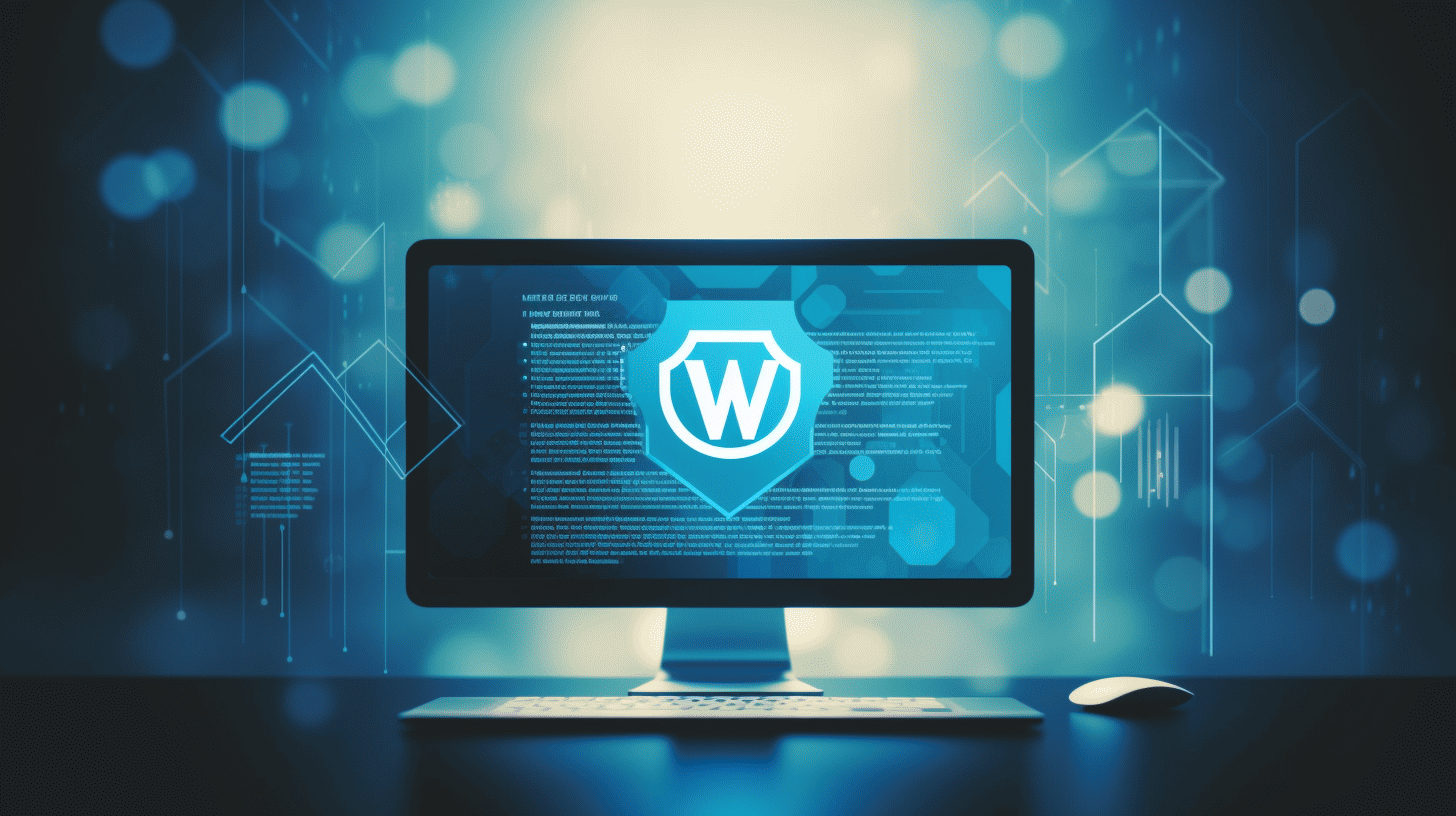WordPress 是世界上最受歡迎的內容管理系統之一,為數百萬個網站提供支援。雖然其用戶友好的介面和龐大的外掛程式庫使其成為網站所有者的首選,但專注於 WordPress 網站的安全性也很重要。隨著網路威脅和攻擊的不斷增加,保護您的網站免受潛在漏洞的侵害應該是首要任務。
在本文中,我們將比較和分析頂級的 WordPress 安全插件,幫助您選擇最好的插件來保護您的網站。我們將探討 WordPress 安全的重要性、WordPress 網站的常見威脅以及您應該採取的基本安全措施。然後,我們將深入研究頂級插件的功能和能力,考慮一般功能、安全措施、易用性、定價和支援等因素。最後,我們將為您提供有關如何選擇滿足您特定需求的 WordPress 安全性外掛程式的指導。
因此,無論您是小型企業主、部落客還是電子商務網站所有者,了解和實施強大的安全措施對於您的 WordPress 網站的成功和長期可持續性都至關重要。讓我們深入探索令人興奮的 WordPress 安全世界! 🚀
了解 WordPress 安全性
WordPress 是全球最受歡迎的內容管理系統 (CMS) 之一,為數百萬個網站提供支援。它的易用性和靈活性使其成為個人和企業的首選。然而,隨著普及,也帶來了成為網路威脅目標的風險。這就是為什麼了解 WordPress 安全性對於每個網站所有者來說都至關重要。
WordPress 安全的重要性
確保您的 WordPress 網站的安全性對於保護您的資料、使用者資訊和整體線上聲譽至關重要。以下是 WordPress 安全性應成為重中之重的幾個原因:
- 保護敏感資料:WordPress 網站通常包含有價值的訊息,例如客戶資料、財務記錄和智慧財產權。確保這些資料的機密性和安全性對於任何企業來說都至關重要。
- 防止網站停機:網站受到攻擊可能會導致停機,從而給網站所有者和訪客帶來不便。停機可能會導致收入損失、客戶信任度降低以及對搜尋引擎排名產生負面影響。
- 防範惡意軟體:惡意軟體可以透過主題、外掛程式或弱密碼中的漏洞感染 WordPress 網站。這些惡意程式可以竊取敏感資訊、破壞您的網站或危害訪客的裝置。
- 維護 SEO 排名:搜尋引擎在排名中優先考慮安全的網站。受到入侵的網站可能會被標記為不安全,導致搜尋引擎可見性和自然流量下降。
WordPress 網站的常見威脅
了解 WordPress 網站的常見威脅對於有效保護您的網站至關重要。一些最常見的風險包括:
- 暴力攻擊:駭客使用自動腳本猜測使用者名稱和密碼並未經授權存取您的 WordPress 網站。
- 易受攻擊的外掛和主題:過時或編碼不良的外掛程式和主題可能會引入安全漏洞,為攻擊者提供切入點。
- SQL 注入:攻擊者利用 WordPress 外掛程式、主題或自訂中的不安全程式碼來取得您網站資料庫的未經授權的存取。
- 跨站點腳本 (XSS):惡意腳本被注入到您的網站程式碼中,以操縱或竊取使用者的敏感資訊。
WordPress 的基本安全措施
為了保護您的 WordPress 網站免受潛在威脅,實施基本的安全措施至關重要。以下是一些需要考慮的基本安全措施:
- 保持 WordPress 和外掛程式為最新版本:定期更新 WordPress 核心、主題和插件,以確保您擁有最新的安全性修補程式和錯誤修復。
- 使用強大且獨特的密碼:不要低估強密碼的重要性。使用大寫和小寫字母、數字和符號的組合。
- 安裝受信任的安全插件:利用安全插件,例如 蘇庫裡 或者 字柵欄 監控並保護您的網站免受威脅。
- 定期備份您的網站:定期備份您的網站,包括檔案和資料庫,以確保在發生攻擊或資料遺失時能夠快速復原。
請記住,實施這些安全措施只是一個起點。 WordPress 安全性是一項持續不斷的努力,隨時了解最新威脅和最佳實踐對於有效保護您的網站至關重要。
WordPress 安全性外掛的功能
WordPress 安全性外掛對於保護您的網站免受潛在威脅和漏洞至關重要。隨著網路攻擊和駭客攻擊的不斷增加,確保 WordPress 網站的安全變得前所未有的重要。在本節中,我們將探討這些安全性外掛程式成為任何網站所有者必備的關鍵功能。
一般特徵
選擇 WordPress 安全性外掛時,您應該考慮幾個常規功能。這些特性有助於提高插件的整體有效性和功能:
- 惡意軟體檢測與移除: 好的安全插件應該具有強大的惡意軟體檢測和刪除功能。它應該能夠掃描您的網站以查找任何惡意程式碼或檔案並將其刪除以確保您網站的完整性。
- 防火牆保護: 防火牆是抵禦未經授權的存取和惡意活動的第一道防線。尋找提供防火牆的安全插件,為您的網站添加額外的保護層。
- 登入保護: 雙重身分驗證和暴力攻擊預防等登入保護功能可以幫助保護您的網站免於未經授權的存取嘗試。
- 定期安全掃描: 定期安全掃描對於識別漏洞並在漏洞被利用之前修復它們至關重要。尋找提供自動掃描或允許您定期安排掃描的插件。
- 安全審計日誌: 詳細的審計日誌可以幫助您追蹤和監控您網站上的活動。尋找提供全面日誌的安全插件,包括登入嘗試、文件變更和其他與安全相關的事件的詳細資訊。
安全措施
WordPress 安全性外掛程式採用各種安全措施來保護您的網站免受威脅。這些措施包括:
- 網站強化: 好的安全插件將提供增強您網站安全設定的功能,使其更能抵禦攻擊。
- 文件完整性監控: 此功能可監控您網站的文件,並在發生任何未經授權的變更時提醒您,協助您偵測並應對潛在的安全漏洞。
- 使用者角色管理: 它允許您限制存取並為使用者分配不同的角色,確保只有授權個人才能存取您網站的敏感區域。
- 黑名單/白名單功能: 為 IP 位址或使用者代理程式建立黑名單或白名單的功能可以幫助您封鎖惡意使用者或授予受信任使用者的存取權限。
易於使用
安全插件的易用性是一個需要考慮的重要因素,特別是當您不懂技術的時候。尋找提供以下功能的插件:
- 使用者友善的介面: 該插件應該有一個乾淨、直覺的介面,讓您可以輕鬆配置和管理其設定。
- 易於安裝/設定: 該插件應該提供簡單的安裝和設定說明,即使對於沒有技術專長的用戶也是如此。
- 自動更新: 定期更新對於維護您網站的安全性至關重要。尋找提供自動更新的外掛程式來保護您的網站免受新出現的威脅。
定價和支持
選擇 WordPress 安全性外掛時,重要的是考慮定價選項和提供的支援等級:
- 定價: 許多安全插件都提供免費版本和付費版本。評估每個定價層提供的功能,並選擇最適合您的需求和預算的功能。
- 支持: 尋找提供可靠客戶支援的插件,無論是透過文件、常見問題或直接聯繫他們的支援團隊。獲得及時且有用的支援可以大大有助於解決可能出現的任何問題或疑慮。
總而言之,WordPress 安全外掛提供了重要功能來保護您的網站免受潛在威脅和漏洞的侵害。透過正確的安全措施、易用性和支持,您可以確保您的 WordPress 網站保持安全並免受網路攻擊。
比較頂級 WordPress 安全插件
保護您的 WordPress 網站免受潛在威脅和漏洞的侵害至關重要。市面上有許多安全性外掛程式可以幫助您增強 WordPress 網站的安全性。在本文中,我們將比較和分析四個頂級 WordPress 安全插件,以幫助您做出明智的決定,為您的網站選擇哪一個。
外掛程式 1:分析和主要功能
🔒 插件名稱 1
- 主要功能 1:此外掛程式提供即時惡意軟體掃描和警報,以偵測和防止 WordPress 網站上的任何惡意活動。
- 主要功能 2:它提供了強大的防火牆,以阻止可疑 IP 位址和已知攻擊者造訪您的網站。
- 主要功能 3:外掛程式名稱 1 提供定期備份和一鍵復原功能,以確保您的網站在發生任何安全漏洞時能夠快速復原。
- 主要功能 4:它具有全面的登入安全功能,包括雙重認證、登入嘗試限制和登入鎖定,以防止未經授權的存取。
外掛程式 2:分析和主要功能
🔒 插件名稱 2
- 主要功能 1:該外掛提供了一個強大的掃描引擎,可以檢查您的 WordPress 網站是否有漏洞並提供修復建議。
- 主要功能 2:外掛程式名稱 2 提供了強大的暴力破解保護機制,以防止惡意登入嘗試並保護您網站的登入頁面。
- 主要功能 3:它包含一個安全活動日誌,可追蹤您網站上的所有活動,讓您監控和調查任何可疑行為。
- 主要功能 4:外掛程式名稱 2 具有自動惡意軟體清理功能,可自動從您的 WordPress 網站中刪除任何惡意程式碼或檔案。
外掛程式 3:分析和主要功能
🔒 插件名稱 3
- 主要功能 1:此外掛程式提供 Web 應用程式防火牆 (WAF),以保護您的 WordPress 網站免受常見攻擊媒介(例如 SQL 注入、跨網站腳本 (XSS) 等)的侵害。
- 主要功能 2:外掛程式名稱 3 包含一個檔案完整性檢查器,可監視您網站的檔案是否有任何未經授權的修改並立即提醒您。
- 主要功能 3:它提供安全登入功能,其中包含雙重認證、CAPTCHA 和密碼強度強制選項,以增強使用者登入的安全性。
- 主要功能 4:外掛程式名稱 3 提供定期安全審核,分析您的 WordPress 網站是否有潛在漏洞並建議必要的安全性增強措施。
外掛程式 4:分析和主要功能
🔒 插件名稱 4
- 主要功能 1:此外掛程式提供了全面的安全掃描程序,可偵測 WordPress 網站上的任何惡意軟體或安全性問題。
- 主要功能 2:外掛程式名稱 4 包含強大的登入保護功能,可封鎖多次登入失敗的 IP 位址,並允許您將可疑 IP 列入黑名單。
- 主要功能 3:它提供了功能豐富的防火牆,以保護您的網站免受惡意機器人、暴力攻擊和其他線上威脅。
- 主要功能 4:外掛程式名稱 4 提供定期的安全性更新,以確保您的網站免受新出現的安全漏洞的侵害。
透過比較這四個頂級 WordPress 安全性外掛的主要功能,您可以做出明智的決定,選擇哪一個適合您網站的特定安全需求。為您的 WordPress 網站選擇合適的安全性外掛程式時,請記住考慮易用性、客戶支援以及與其他外掛程式的兼容性等因素。保持安全並確保您的網站安全!
如何選擇 WordPress 安全性插件
🔒 確定您網站的安全需求
當談到 WordPress 安全性時,並沒有一種解決方案可以解決所有問題。在為您的 WordPress 網站選擇安全性外掛程式之前,評估您網站的特定需求至關重要。請考慮以下因素:
- 網站類型: 確定您的網站的性質。它是個人部落格、電子商務網站還是公司網站?對安全威脅的敏感度等級可能會因網站的類型而異。
- 交通量: 評估您的網站所產生的流量。流量較大的網站往往會吸引更多駭客和惡意行為者的注意。
- 敏感資訊: 確定您的網站是否收集或儲存敏感資訊,例如使用者資料、付款詳細資訊或客戶記錄。如果您的網站處理敏感訊息,您將需要一個能夠為這些數據提供強大保護的插件。
- 安全信心: 評估您自己管理網站安全的技術專業水平和信心。有些插件提供需要技術知識的更高級功能,而其他插件則具有適合初學者的使用者友善介面。
一旦您清楚地了解了網站的安全需求,您就可以更好地選擇滿足這些要求的 WordPress 安全性外掛程式。
🔍 分析插件的功能
並非所有安全插件都是平等的。在評估不同的 WordPress 安全性外掛時,分析其功能和特性至關重要。請考慮以下幾點:
- 惡意軟體掃描: 尋找提供常規惡意軟體掃描和檢測的插件。強大的惡意軟體掃描功能有助於識別並刪除您網站中的任何惡意程式碼或檔案。
- 防火牆保護: 防火牆保護對於防止未經授權存取您的 WordPress 網站至關重要。確保您選擇的外掛程式包含防火牆功能,其中包含 Web 應用程式防火牆 (WAF) 和暴力攻擊保護選項。
- 雙重認證(2FA): 雙重身份驗證要求用戶提供第二種身份驗證形式(例如發送到其手機或電子郵件的唯一代碼),從而增加了一層額外的安全性。考慮提供 2FA 作為額外安全措施的插件。
- 定期更新和支援: 檢查插件是否定期更新並得到開發人員的支援。定期更新可確保及時解決任何安全漏洞,保護您的網站免受新出現的威脅。
👩💻 考慮使用者體驗
使用者體驗對於 WordPress 安全性外掛的有效性至關重要。尋找提供無縫且用戶友好體驗的插件,包括:
- 易於安裝: 選擇一個可以輕鬆安裝和配置的插件,而不需要大量的技術知識或編碼技能。
- 直覺的介面: 該插件應該有一個用戶友好的介面,讓您輕鬆導航和管理其功能。
- 通知和警報: 好的安全外掛程式會讓您隨時了解任何安全威脅,透過電子郵件或直接在 WordPress 儀表板內發送警報。
- 文件和支援: 確保插件提供全面的文檔和可靠的客戶支持,以幫助您解決可能遇到的任何問題或疑問。
💰 評估價格價值比
雖然安全性至關重要,但考慮所選的安全插件的性價比也至關重要。需要評估的一些關鍵面向包括:
- 定價計劃: 檢查插件是否提供不同的定價計劃以適應不同的預算和業務需求。
- 功能與價格: 將不同插件提供的功能與其各自的價格點進行比較。考慮這些功能是否符合您網站的安全要求,以及價格是否與所提供的價值相符。
- 評論和聲譽: 研究插件的聲譽並尋找用戶評論來衡量安全解決方案的有效性和可靠性。
請記住,僅根據價格選擇安全插件可能會使您的網站容易受到攻擊,因此請確保優先考慮價值和功能而不是成本。
透過考慮這些因素並進行徹底的研究,您可以自信地選擇適合您網站獨特安全需求的 WordPress 安全性外掛程式。保護您的網站並安心地知道您已經採取了必要的預防措施來保護您的 WordPress 網站。
🔒 使用強大的安全性外掛程式保護您的 WordPress 網站。查看 我們推薦的 WordPress 安全插件 提供可靠的保護。
結論
總而言之,選擇正確的 WordPress 安全性外掛程式對於保護您的網站免受潛在威脅和漏洞至關重要。透過選擇提供全面功能、強大安全措施、易於使用和可靠支援的插件,您可以確保保護您寶貴的線上資產。
在做出決定時,請考慮評估以下因素:
- 確定您網站的安全需求: 考慮到您的 WordPress 網站的特定安全要求。評估您的數據的敏感度及其可能面臨的潛在風險。
- 分析插件的功能: 徹底分析每個安全插件的特性和能力。尋找惡意軟體掃描、防火牆保護、暴力攻擊預防和漏洞修補等功能。
- 考慮使用者體驗: 選擇一個用戶友好且直覺的插件。無縫的介面和清晰的文件將使您更輕鬆地瀏覽和有效地配置插件。
- 評估價格價值比: 考慮每個安全插件提供的定價方案和支援選項。確保成本與您將獲得的保護價值和等級相符。
為了簡化保護您的 WordPress 網站和確保最佳效能的過程,Managed-WP™ 提供了優質託管的 WordPress 雲端託管平台。憑藉我們專家的全天候支援和簡化的基礎設施,您可以專注於創造卓越的數位體驗,而將安全和技術方面的問題交給我們。了解有關 Managed-WP™ 的更多信息 在这里,.
常見問題解答
- WordPress 的頂級安全外掛有哪些?
WordPress 的頂級安全插件是:1. Wordfence Security、2. Sucuri Security、3. iThemes Security、4. All In One WP Security & Firewall 和 5. BulletProof Security。
- 我的 WordPress 網站是否需要安全性外掛?
是的,為您的 WordPress 網站使用安全性外掛程式對於保護您的網站免受潛在威脅、惡意軟體、駭客攻擊和其他安全漏洞的侵害至關重要。
- 我應該在 WordPress 安全性外掛中尋找哪些功能?
選擇 WordPress 安全性外掛程式時,請尋找惡意軟體掃描和刪除、登入安全性、防火牆保護、檔案完整性監控、雙重認證和定期安全審核等功能。
- 我可以在我的 WordPress 網站上使用多個安全性外掛嗎?
不建議在 WordPress 網站上使用多個安全插件,因為它們可能會相互衝突並導致效能問題。選擇一個適合您需求的綜合安全插件並定期更新它。
- 如何為我的 WordPress 網站選擇正確的安全外掛?
為您的 WordPress 網站選擇安全性外掛程式時,請考慮外掛程式聲譽、用戶評論、活動安裝、定期更新和客戶支援等因素。選擇提供符合您網站安全要求的功能的插件也很重要。



















